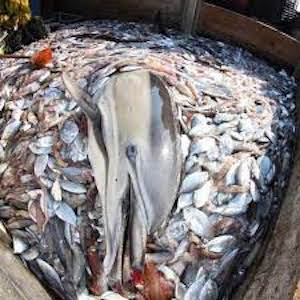The recent release of Seaspiracy on Netflix was an eye opener for many of us. We knew much of the truth, but not the whole truth. I decided to write this, my first post, and to get involved in a much more active way because now, I’m angry. I’ve been getting lied to, and it’s caused me to make choices which have directly contributed to the loss of lives. Important lives that I’ve long considered to be as meaningful as our own, by creatures I believe should be regarded as having the same rights to their lives as we do. And I don’t intend to let a callous, morally indifferent industry continue to get away with it without my pushing back, however I can.
The harmful effects of large-scale commercial fishing are too many to enumerate here, but I’d like to focus on the one that stung me the most, personally. When we consume seafood we are condemning dolphins to die in fishing nets. That’s the reality. All this time that I’ve been buying tuna with dolphin-friendly logos of various types, I’ve been getting lied to. It’s very difficult-to-impossible to monitor what actually happens out at sea. You can literally give your word that your ship’s log is accurate, and someone will let you slap a label on the eventual product that will reassure the public that all due diligence has been taken to ensure the integrity of your product.
The labeling we’ve all come to rely on is nowhere close to any kind of guarantee that no dolphins (or countless other creatures) were victims under that most offensive of terms – ‘bycatch’.
But anger, though better than indifference, will not get it done. The situation we face now is so complex and multifaceted, the pieces so highly interrelated, that the question that will determine the outcome is the extent to which we are able to collaborate on solutions. Human actions driving climate change, wildlife depletion and loss of biodiversity are so far along that significant losses at this point seem inevitable. However, the extent to which we prosper in the long run or fail entirely as a civilization will depend on whether we can raise our general level of awareness of the threats we face, the science behind them, and the possible pathways to solutions.
This level of awareness has clearly been rising in recent years, but we are in a race against time. If we can’t change the rate at which we alter our behaviour, the price will be heavy. And each one of us has a choice to make. Or rather an ongoing series of choices.
To draw from a poignant example in the documentary, someone at the Earth Island Institute obviously made the decision that we’ll be better off if people are buying seafood products with their dolphin safe labeling. Though we can’t guarantee that it’s the case, that label represents a greater probability that no dolphins were harmed. Well, perhaps he or she can live with that, but for me it simply isn’t good enough. We don’t have the right to play with the lives of our fellow sentient beings in this way.
We create an illusion of safety about the products we consume. And people like me live our lives thinking we’re doing the right thing and being responsible. Only to learn that the demand we represent has been doing enormous harm. We should try to empathize with what the experience of suffocating after becoming entangled in a fishing net is really like. Try to imagine it for yourself. It will be no less awful for an animal with the sophistication and intelligence of a dolphin.
Obviously, when we can find cases such as 45 dolphins being killed in a single operation that netted eight tuna – while working under a dolphin safe label – our system is more than broken.* It’s dishonest, ineffective and dysfunctional. And wholly repellent. This is an enormous disservice to an unsuspecting public.
* This example was provided by a representative of Sea Shepherd, one of the finest organizations in existence today. Their direct action campaigns are at the forefront of our fight to protect the overall health of our oceans. Their reputation, in my view, is impeccable and they deserve all the support we can give them.
Until a great many things change, we need to suspect everything that’s being pulled out of the ocean. Our ‘stewardship councils’ and certification processes for seafood have failed us. Badly.
So there are a great many pieces to this problem. Pick one and make your contribution to the whole, however you can. The health of our seas, indeed of our entire world, depends on battles that will be fought on many fronts, with an enormous number of causes worth your time and investment – and deserving of your voice. For myself and my colleagues at CCA, the choice we’ve made along the way is to focus specifically on the well-being of cetaceans – their lives, liberty and environmental factors they need to thrive. Your focus can be whatever you want it to be. But I urge you keep learning and to make your opinion count. The world will need every well-informed voice it can get.
Why whales and dolphins for me? I thought Ric O’Barry, the founder of Dolphin Project, nailed it in the documentary. When it comes to the almost indescribable horrors that take place in the cove at Taiji, Japan, how are we supposed to tackle the much bigger problem of saving the oceans if we can’t even get this right?
For The Orca’s Voice,
Jason, Canadian Cetacean Alliance



Leave a Reply